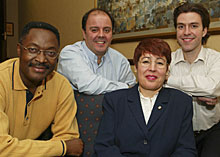Concordia Institute for Information Systems Engineering sends students into the field

Left to right: Adjunct Professor Roch Glitho, Associate Professor Ferhat Khendek, CIISE director Professor Rachida Dssouli and research associate Alex De Marco. The four established the Telecommunications Service Engineering Research Laboratory (TSE) in January 2003. It is funded by a collaborative research grant with Ericsson and NSERC.
Photo by Andrew Dobrowolskyj
Although it is only a year and a half old, the Concordia Institute for Information Systems Engineering (CIISE) is already making its mark with an innovative partnership with industry.
About 10 graduate students are involved in the program. They are currently working at Ericsson Canada’s Research and Development Centre in Montreal. When they finish their research there, they will come back to the lab at Concordia to write their theses, based on the projects they completed at Ericsson.
CIISE Director Rachida Dssouli said,“I felt the Institute should establish a strong relationship with local industry.” The CIISE and this three-year research program with Ericsson are establishing a new model of co-operation.
Dssouli, who came to Concordia as a professor of electrical and computer engineering in June 2001, explained that the Institute was the brainchild of Dean Nabil Esmail. She shared his enthusiasm for the idea, and became its first director a year later.
The CIISE is an interdisciplinary research and training institute. It focuses on innovative applications of information systems (tools based on the discipline of computer science) to a wide range of engineering research fields.
So far, faculty members include Professor Mourad Debbabi, who is working on the acceleration of Java software and on security systems; Yong Zeng, an associate faculty member who is working on the application of design theory to product development; Assistant Professor Chadi Assi, who researches optical networks; and Amin Hammad, an associate professor specializing in information technology applied to building and civil engineering. Roch Glitho is an adjunct associate professor with the Institute, based at Ericsson.
The Institute is expanding rapidly. Dssouli expects there will be 10 more faculty members by the end of June, and the total should reach 25 by December 2004. “Right now we are hiring extensively in several areas of research.” They are interviewing applicants from Canada, the U.S., and as far away as Japan. Some of these people are bidisciplinary, with PhDs in both engineering and computer science, for example.
The Institute currently has two main research groups. Debbabi’s Middleware Acceleration and Security Research Group (MAS) involves about 10 students, and will soon be signing contracts for new projects. The Telecommunications Service Engineering Research Laboratory (TSE), established in January 2003, is funded by a collaborative research grant with Ericsson and by NSERC. It consists of nearly 15 graduate students, faculty and staff, and was established to develop tools and techniques to build, test, and deliver high-quality, innovative “value-added” services.
Telecommunications service providers depend on complex new services, such as business-to-business communication over the Internet, multiparty gaming, telephone-based conferencing, customized stock quotes, and Web surfing from cellular phones, to attract customers. TSE researchers are concentrating on two areas: Web services technology, and informal wireless networks.
To increase its profile, the CIISE held an open house in December that attracted more than 45 representatives from several large firms, faculty and students. CIISE’s Industrial Advisory Board, which has members from Ericsson, IBM, Pratt & Whitney, DRDC, Alcatel, Excendia, Novatech and Cisco Systems, also met that day.
Dssouli is confident that industry can have input into CIISE’s future without compromising the Institute’s academic integrity. “We can’t continue to do research without understanding the problems that exist in industry,” she said. “We can do a lot of theory, but to contribute to society and progress in technology, we need to understand the actual needs and problems that people in industry are facing.”
As for the student residence program at Ericsson, Dssouli notes that the students benefit when they learn to collaborate with other people in the work setting, and to meet tight deadlines. When these students graduate, they should have skills that will help them build successful careers.